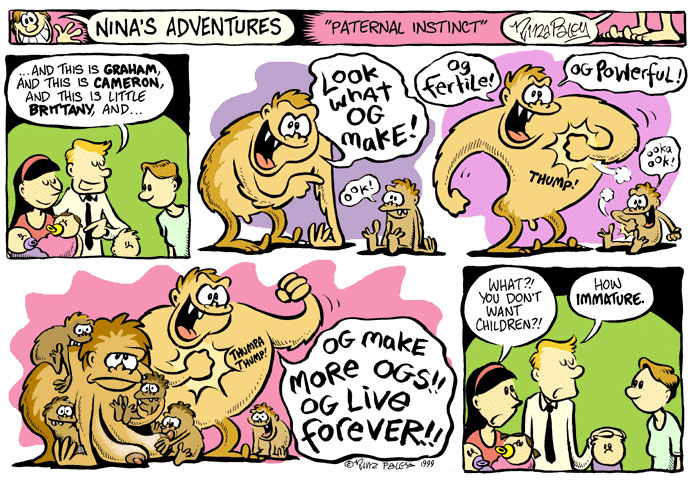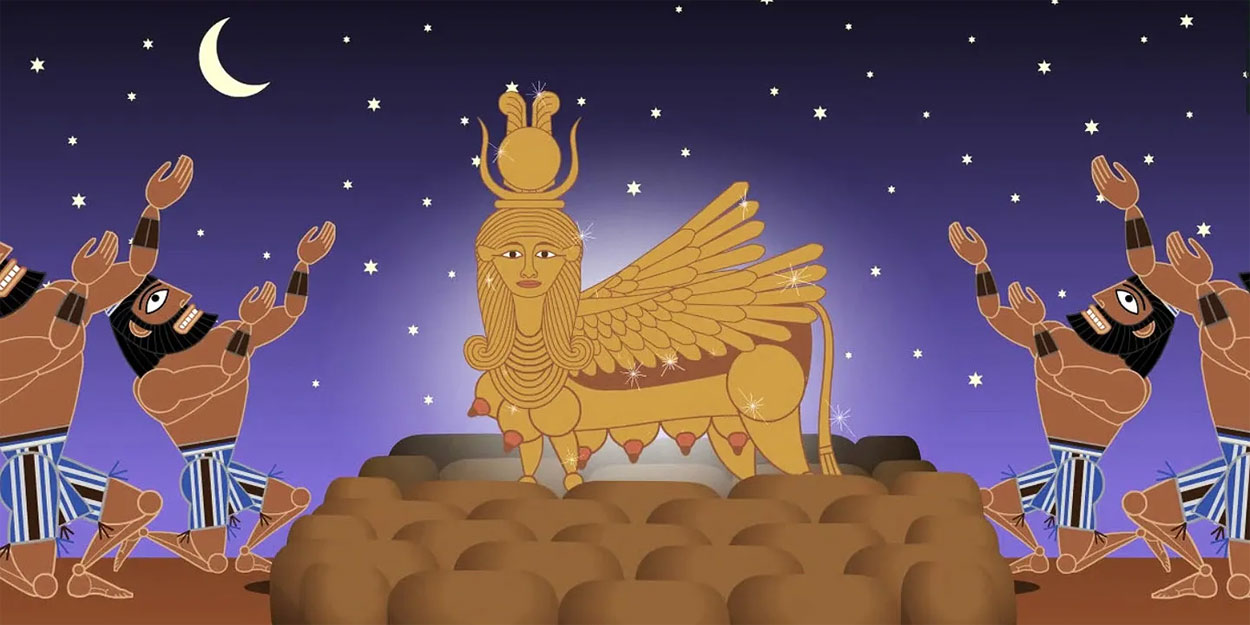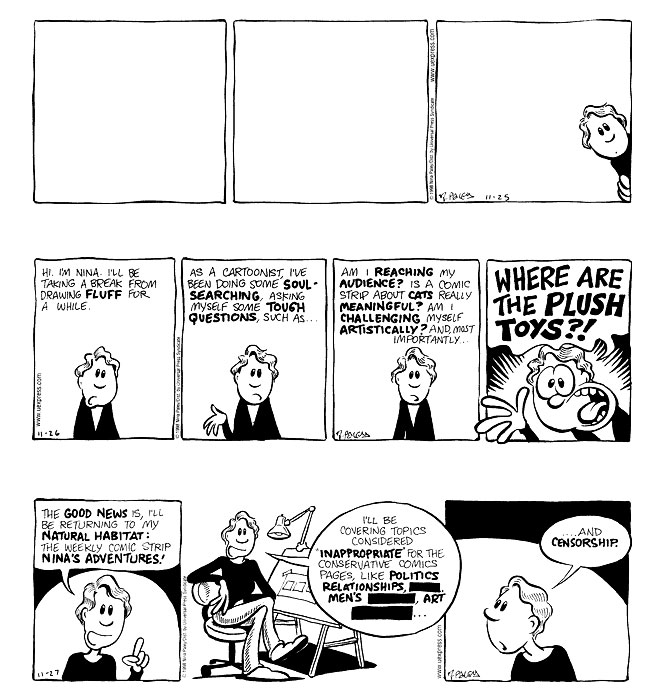'Nina's Adventures' (1999).
Nina Paley is an American comic artist and animator. She drew the autobiographical comic series 'Nina's Adventures' (1988-1995), before moving into a more mainstream style with the gag-a-day comics 'Fluff' (1995-1998) and 'The Hots' (2002-2003). Paley is a strong advocate of birth control and free content sharing, while criticizing overpopulation, the consumption industry and copyright law. These themes return in much of her works, including her webcomic 'Mimi & Eunice' (2010). As an animator, she is known for her creative musical interpretations of religious mythology. So far, she has tackled Hinduism ('Sita Sings the Blues', 2008), Judaism ('Seder-Masochism', 2018) and Christianity ('Apocalypse Animated', 2020).
Early life and career
Nina Carolyn Paley was born in 1968 in Urbana, Illinois. Her father was a math professor, and also mayor of her birth town between 1973 and 1977. Nina's cousin Deborah Yanowski is also active as a painter. Despite being of Jewish descent, Paley was raised in an atheist household. When she was 12-13 years old, she made her first animated shorts with help from a neighbor's Super 8 camera and Kit Laybourne's 'The Animation Book'. In the field of animation she was strongly influenced by Tex Avery, Bruno Bozzetto, Terry Gilliam, Chuck Jones and George Dunning, as well as Heinz Edelmann's feature film 'Yellow Submarine' (1968). Her creativity and self-assuredness in general were motivated by Keith Johnstone's book 'Impro For Storytellers' (1999), which emphasizes creative expression by bypassing the ego, overcoming fears of drawing and storytelling and feeling safe enough to take risks in groups.
Together with her high school history teacher Chris Butler, Paley made her first comic strip, 'History of the North Pole'. As a student at University High School in Urbana, Illinois, she published the comic feature 'Joyride' in the student newspaper Daily Illini. Around this time, she also discovered comics like Sam Hurt's 'Eyebeam', Matt Groening's 'Life in Hell' and the work of Lynda Barry, which made her realize that the medium could also discuss more meaningful adult themes, without losing a sense of humor. In 1986, she graduated, but kept active in the university's art department for two more years. Paley has worked as a teacher in visual storytelling and Flash for film and video at Parsons The New School for Design. In 2002, she briefly lived in Trivandrum, India.
Views on birth control and overpopulation
Paley is a strong opponent of the idea that every couple should automatically start a family. In her opinion, people, especially women, are put under too much pressure to have children. All while many people sacrifice a lot of things to raise children they never really wanted. That burden is especially heavy for their kids, who are raised with excessive guilt and resentment. Paley refers to Dr. Charles Hall's paper's 'The Environmental Consequences of Having a Baby in the United States', which argues that overpopulation brings along overconsumption and over-industrialisation, with severe consequences for the environment. She expressed her ideas in animated shorts like 'The Stork' (2002) and 'Thank You For Not Breeding' (2002). She also made several comics for the Voluntary Human Extinction Movement.
'Nina's Adventures', 3 February 1989.
Nina's Adventures
In 1988, Paley moved to Santa Cruz, California, where she created her best known work, 'Nina's Adventures' (1988-1995). The autobiographical comic featured a humorous look on her daily life. Most of the illustrated anecdotes were directly based on things she wrote down in her journals. Paley considered the comic an outlet for her depression. 'Nina's Adventures' ran in the news weeklies The Santa Cruz Comic News, the L.A. Reader, Comic Relief Magazine, The Funny Times and The San Francisco Examiner. Book collections of the series were published under the titles 'Depression is Fun!' (Hineni Consciousness Press, 1992) and 'Nina's Adventures' (with Rick Burkhardt, Pentshack Press, 1993). The story 'Nina's Adventures in Mental Hell' has been published in Rip Off Comix, issue #29 (Rip Off Press, 1990), 'Nina's Adventures' in Naughty Bits (Fantagraphics, 1991), while 'Nina's Adventures in Santa Cruz' and 'Nina's Wonderful World of P.M.S.' have also been printed in The Complete Wimmen's Comix issue #2 (Fantagraphics, 2016)
Fluff
In 1995, Paley felt unsatisfied with being an alternative cartoonist, since it wasn't enough to pay the bills. She decided to make a more traditional comic and went to a mainstream syndicate, Universal Press. Her gag-a-day comic 'Fluff' (1995-1998) revolved around the funny behavior of dogs and cats. During the later years, Ian Akin was her co-writer. The series has also been translated into Norwegian. Although 'Fluff' provided Paley with a better income, she felt limited by the pet-themed format and eventually discontinued the strip. The final episodes feature her directly addressing the readers to explain her motivations.
'The Hots' appeared in Dutch translation under the title 'Leve de Liefde!' in the Belgian newspaper Het Laatste Nieuws (15 June 2004). Note that the cartoonist's name is misspelled in the credit byline. Translation: "This weather is so weird, rain, sun, rain, sun, rain, sun..." - "If we strive for a deeper understanding of things, we find they aren't as weird as they seem. Or was yours a casual observation that didn't require a pedantic response?" - "But you're such a cute pedant."
The Hots
Together with scriptwriter Stephen Hersh, Paley launched another newspaper gag-a-day comic, 'The Hots' (2002-2003), syndicated by King Features. The comic features Max and Hannah, a young Jewish-American couple in New York. Contrary to popular thought, Paley and Hersh weren't a couple, so 'The Hots' wasn't a reflection of the authors' own romantic life. The comic also ran in Dutch (as 'Leve de Liefde!' in the Flemish newspaper Het Laatste Nieuws) and Norwegian. After a year, King Features discontinued 'The Hots', because not enough newspapers carried it to make its publication lucrative.
Mimi & Eunice
On 9 March 2010, Paley created 'Mimi & Eunice', which she published on her personal blog. The series features two anthropomorphic creatures with dog ears who are more head than body. Mimi is recognizable by her pointy ears and Eunice by her hanging ones. The gags have a philosophical tone. Mimi and Eunice discuss politics and capitalism, but most of all copyright law and intellectual property. Two compilation books have been published, 'Misinformation Wants To Be Free' (2010) and 'Mimi & Eunice: Questions about Copyright' (Ediciones EK, 2012), both also translated into Spanish.
Still from: 'Sita Sings The Blues'.
Animation career
During the late 1990s, Nina Paley began experimenting with animation. Her first production was the clay-animated short 'Luv Is...', filmed on Super-8. Two months later, she used a Russian 16mm wind-up camera to shoot her second clay short, 'I ♥ my Cat'. After that, she began working on 'Pandorama', a three-minute "camera-less" short with the theme of Pandora's Box, for which she used all kinds of images of techniques. On 6 December 1999, the film had a private industry screening at the Sony IMAX Theater at Metreon in San Francisco. Her next film, 'Fetch!' (2001), was a humorous animated short based on optical illusions. 'The Stork' (2003) was controversial because of its satirical attack on population growth. The film depicts storks dropping babies from the sky and destroying Earth as a result. She has worked as a freelance animator for Duck Studios.
Sita Sings the Blues
When in 2002 Paley's marriage ended, she found comfort in the 'Ramayana', an ancient Indian poem that coincidentally mirrored what she had gone through recently. The Hindu mythological tale follows the gods Sita and Rama who, despite being incarnated as humans, still have marital troubles: Rama rejects Sita. Paley felt a strong emotional connection and decided to adapt the 'Ramayana' into an animated feature-length musical film, weaving her own relation problems into the narrative. The picture was animated in Flash, with scanned-in watercolor paintings. Afterwards she edited everything in Final Cut Pro. The end result, 'Sita Sings the Blues', premiered on 11 February 2008 during the Berlin International Film Festival.
'Sita Sings the Blues' is a playful, but respectful adaptation of the Ramayana and Hinduism in general. The picture received positive reviews, among others by film critic Roger Ebert and 'Simpsons' creator Matt Groening, and won several awards. Unavoidably, the film also attracted controversy from people who felt the picture was offensive to Hindus, and others who felt a white Westerner shouldn't appropriate another culture, because it comes across as "racist" and "neocolonialist". Paley felt that an artist, above all, should mostly be true to her of his own vision. For this same reason, she didn't want to remove some copyrighted 1920s songs by Annette Hanshaw on the soundtrack. She originally thought the recordings were old enough to be in the public domain, but it turned out that the compositions themselves weren't. Still, Paley wanted to keep the songs, since she was amazed that they fit the narrative so well. Using songs specifically recorded for the film would have felt contrived. While some wondered whether 1920s American songs or Paley's own personal experiences belong in an Indian ancient epic, even though the humanity is similar. It all deals with the same timeless and universally recognizable emotions. To avoid the copyright issues, she released 'Sita Sings the Blues' under a Creative Commons Share Alike license, meaning there are no exclusive rights to be granted. She did offer her assistance and endorsement for screenings and interviews. But otherwise, everybody's free to watch and share her film. Because the only alternative she had was not making or releasing the film, something that happens too often with artists who lack enough money.
Seder-Masochism
Paley's next animated project, 'Seder-Masochism' (2018), was made in the same spirit as 'Sita Sings the Blues', but this time delved into her own religious background. Because, even though she came from an atheist Jewish background, her family still celebrated Passover every year. Paley's father felt it was important to raise his children with a cultural identity. 'Seder-Masochism' analyzes the Book of Exodus and how, despite widespread worship of Egyptian mother-goddesses, Moses promoted Judaism as a patriarchal religion. Much like 'Sita Sings the Blues', Paley felt that the original religious text "doesn't make much sense". Both Rama in the Ramayana and Yahweh in the Torah and Bible are supposed to be "good", while the way they are depicted in these tales makes them come across quite the opposite. She was particularly interested in the people who were "disobedient", by worshipping the Golden Calf and therefore being killed by God. Paley also didn't see the ancient Egyptians as the "enemies", like they are often portrayed in the Old Testament. After all, they too had their own religion and culture that shared many similarities with Hebrew mythology.
One scene from the film, a musical segment titled 'This Land Is Mine', was already released online in October 2012, and quickly became a viral hit. The scene depicts various people throughout history slaughtering each other over territory, set to 'The Exodus Song', written and recorded by Pat Boone. Many viewers felt it accurately portrayed the insanity of claiming land "because God gave it to me." Since the short also portrayed the Israeli-Palestinian conflict, some ironically criticized her for both "being a Zionist" and an "anti-Zionist".
Various songs on the soundtrack are well-known pop and rock songs by artists like Dalida, Gloria Gaynor, Led Zeppelin, The Four Tops and The Beatles. Paley voices a sacrificial goat in the film, while her father (who died before the picture premiered) voiced God. She recorded his voice while he was already in the hospital, a few months before his death. Interviewed by Pauline Dolle for nycreligion.info (3 April 2018), Paley said: "(...) I was hoping for a profound connection that I did not find, to explore the religion of my father, who is an atheist, more than I am, and now I understand why. There was this really great moment when I was trying to find common ground with him over Passover and he found ways to tell me that I should be making more money and how I’m a disappointment. It captures my sad relationship with Dad. Here I find many comparisons between Sita and this project. Sita was exploring God as husband. Seder is God as father. My relationship with Dad is less than ideal. Interestingly, I came to embrace atheism more. We’re told that it’s incredibly important to have a profound relationship with dad. Maybe that’s bullshit too."
Apocalypse Animated
In 2020, Paley made 'Apocalypse Animated' (2020), an animated adaptation of The Book of Revelation, the last book of the New Testament. Again, she used old gospel songs on the soundtrack, like 'When the Fire Comes Down' (1947) by Milton Estes And His Musical Millers, which warns of apocalyptic horror if people don't repent, while using a strangely jolly melody.
Views on free content sharing
A vocal supporter of free content sharing, Nina Paley invented the slogan "Copying Is Not Theft", which she adapted into an educational short and a song. Another series of animated shorts by Nina Paley, 'Minute Memes', deals with intellectual freedom. She has also been artist-in-residence for QuestionCopyright.org. In her opinion, all creative work is derivative in one form or another. All artists build on stories, imagery or audio that existed before, consciously or subconsciously. But in general, many copyright holders hold media privately and want to make as much money from it as they can. In Paley's opinion, quite the opposite happens. By preventing other people from freely using their copyrighted material, they actually hurt the notability and therefore any additional profits this media might have or make. Paley feels this is especially sad for the creativity of artists, because they refrain from using licensed characters, music, literature or films in their work in order to avoid legal problems. Even if they do try to get an official license, lawyers and copyright holders will dictate what the work should be. In Paley's view, the copyright system suppresses art, effectively forcing artists to make creative choices based on licensing concerns instead of their artistic vision.
To make a good example of herself, Paley has made all of her comics and films available online for copying and file sharing. Paley mostly earns her money through donations, commissions, grants, patrons, speaking fees and selling originals. In her opinion, her fans do more to distribute her work, and find money for her, than a commercial distributor could. Because some people, whether comic/movie fans, teachers or curators, will eventually want to own a copy of her freely downloadable comics and films.
Nina Paley appeared in the final episodes of her 'Fluff' strip to announce the strip's ending.
Graphic contributions
Nina Paley contributed the short comic 'People Like This Really Exist' to 'Choices: A Pro-Choice Benefit Comic Anthology for the National Organization for Women' (Angry Isis Press, 1990). She published the ironically titled 'Kute Kitty Kartoon' in issue #53 (August 1991) of Dark Horse Presents and livened up the pages of Karen G.R. Roekard's coloring book 'The Santa Cruz Haggadah: a Passover Haggadah, Coloring Book, and Journal for the Evolving Consciousness.' (Consciousness Press, 1991). She visualized the Grateful Dead songs 'Casey Jones' and 'Truckin'' in respectively Grateful Dead Comix, Volume 1 and 4 (Kitchen Sink Press, 1992), a graphic tribute to the psychedelic rock band The Grateful Dead by various cartoonists. On 15 February 2021, pop singer Gala (best known for her 1997 hit single 'Freed From Desire') released the music video 'Parallel Lines', for which Paley provided the animation.
Recognition
In 2006, Nina Paley was awarded a Guggenheim Fellowship. Her short 'The Stork' won a 2003 award at the EarthVision Environmental Film Festival in Santa Cruz. 'Sita Sings the Blues' won a Gotham Award for "Best Film Not Playing at a Theater Near You" and "Best American Feature" at the Festival of Avignon and "Best Feature" at the Animation Festival of Annecy. 'Seder-Masochism' won "Best Animated Feature" at the ANIMATOR film festival in Poland. On 3 August 2010, Paley also received a Public Knowledge IP3 award for her work in intellectual property.











